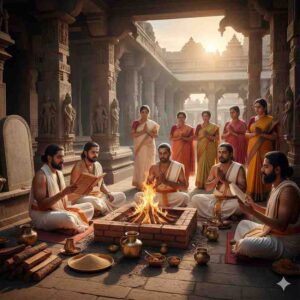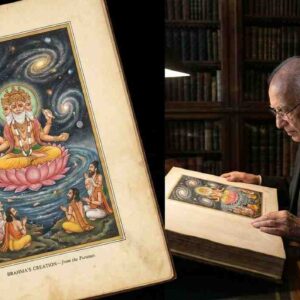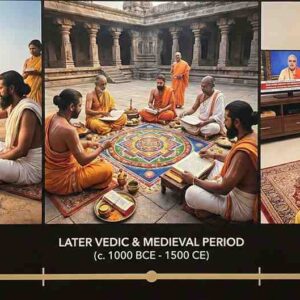TheVedas, among the oldest scriptures in human history, hold a foundational position in Hinduism and Indian philosophy. Revered asShruti(that which is heard), they are considered divinely revealed knowledge. However, their interpretation has sparked debate for centuries—are the Vedas purely sacred texts of faith, or do they also serve as philosophical guides?
Vedas as Sacred Texts of Faith
The Vedas primarily guide religious practices and spiritual devotion. Comprising four texts—theRigveda,Yajurveda,Samaveda, andAtharvaveda—these scriptures encompass hymns, rituals, and prayers designed to foster a connection with the divine.
Faith and Rituals in the Vedas:
- Hymns and Prayers: The Rigveda, for instance, contains hymns dedicated to deities like Agni (fire) and Indra (rain), symbolizing humanity’s reverence for natural and cosmic forces.
- Ritualistic Practices: The Yajurveda outlines the performance of yajnas (sacrifices), ensuring harmony with cosmic laws.
- Mantras: The Samaveda, often referred to as the “Veda of melodies,” provides chants and mantras central to Vedic worship.
For believers, the Vedas are infallible texts that dictate moral and spiritual codes. They emphasizeDharma(duty) andRta(cosmic order), creating a structured framework for religious life.
Vedas as Philosophical Guides
Beyond their ritualistic elements, the Vedas delve deeply into philosophical inquiry. The latter portions of the Vedas, known as theUpanishads, are particularly influential in shaping Indian philosophy. These texts focus on metaphysical concepts likeBrahman(ultimate reality) andAtman(self), moving away from ritualism toward intellectual exploration.
Philosophical Themes in the Vedas:
- Nature of Reality: The Upanishads question the nature of existence, emphasizing unity between the individual soul (Atman) and the universal consciousness (Brahman).
- Eternal Truths: The Vedas assert that truth is eternal and universal, transcending temporal and cultural boundaries.
- Ethics and Knowledge: Concepts like Karma (action) and Moksha (liberation) are explored, encouraging individuals to seek enlightenment through self-awareness and introspection.
Philosophers likeAdi Shankaracharyadrew heavily from the Upanishads to establish theAdvaita Vedanta(non-dualism) school of thought, which emphasizes the oneness of all existence.
Reconciling Faith and Philosophy
Rather than being mutually exclusive, the Vedas embody both faith and philosophy. Their dual nature allows them to address diverse spiritual and intellectual needs:
- For practitioners, the Vedas provide rituals and mantras to cultivate devotion.
- For seekers, they offer profound philosophical insights into the nature of reality and self.
This synthesis is evident in texts like theBhagavad Gita, which bridges devotional practices with philosophical discourse, demonstrating how faith and reason can coexist harmoniously.
A Modern Perspective
The relevance of the Vedas today lies in their ability to inspire both religious devotion and critical inquiry. While rituals from the Vedas continue to shape Hindu ceremonies, their philosophical teachings are increasingly applied to global issues like sustainability and mindfulness.
Conclusion
The Vedas are not limited to being mere sacred texts of faith or philosophical guides; they are both. Their holistic approach to spirituality and intellect makes them timeless resources for understanding existence, ethics, and the divine. By embracing both aspects, the Vedas remain profoundly relevant in navigating the complexities of modern life.










